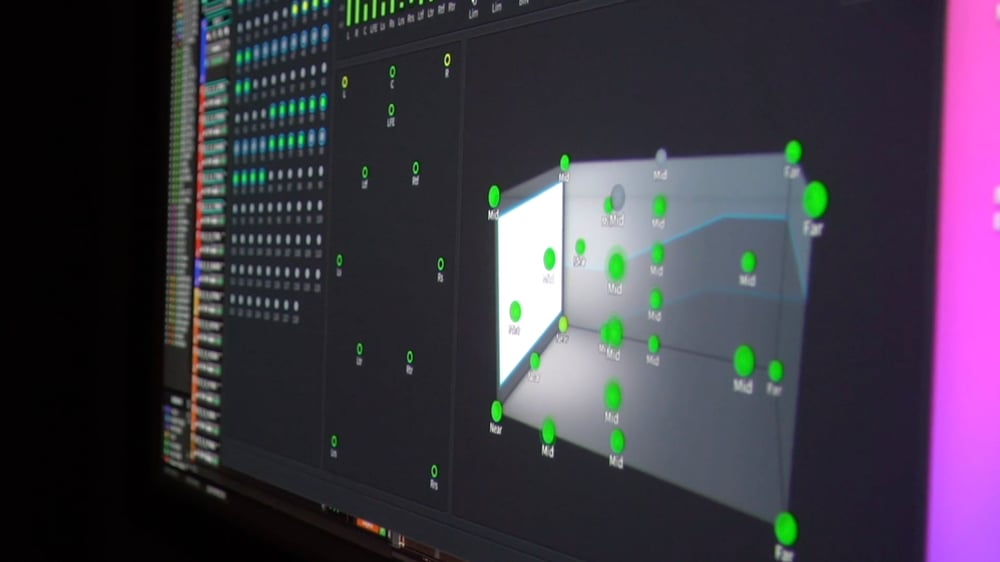Interested in studying a sound design degree? Discover the key skills you’ll learn during your BA (Hons) Music & Sound for Film & TV degree at dBs Institute.
If you’re interested in the science of sound, want to learn how sound effects are produced for visual media and love immersing yourself in the audio environments of films, TV shows, and video games, a degree in sound design can help you become part of that world.
At dBs Institute, our BA (Hons) Music & Sound For Film & TV degree is designed to straddle the worlds of music composition and sound design, giving you the broad range of skills needed for a successful career in sound for film, TV and video games.
During your studies on a music production course or sound & audio engineering course at dBs, you’ll learn the technical skills required for sound design jobs and the insider knowledge to break into the industry from our expert tutors. You’ll get to grips with industry-standard equipment and master techniques used in the industry.
Here, we look at the key skills and knowledge you will discover during a sound design degree, like BA (Hons) Music & Sound for Film & TV at dBs Institute, available to study at our Bristol and Manchester campuses.
Contents
- Sound effects for film, TV & video games
- Foley
- Field recording
- Mixing & studio practice
- Sound for film theory
- Post-production
- Immersive audio
- Music industry knowledge
- Developing your professional portfolio
1. Sound effects for film, TV & video games
During your sound design degree, you will learn the practical and creative skills to produce sound effects for film, TV and video games. Using sound design techniques like field recording, Foley, which we will explore in the next section, synthesis and programming, you’ll master the sound effects workflow, from the initial recording to integrating sound effects into visual media projects.
One of the practical methods you will use to develop skill in this discipline at dBs is re-scoring and producing new sound effects for famous scenes in popular films and games. By reworking a popular film or TV set piece, you’ll have to divorce yourself from what exists already and explore new approaches to change the impact of the scene.
Sound effects can have a huge impact on how we experience films, TV programmes and video games. Think of the iconic sound of a lightsaber igniting in Star Wars or the sound of minigun shells raining down to the ground in the helicopter rescue set piece in The Matrix. Without those sounds, audiences would experience those films in a completely different way. During your sound design degree, you’ll play a key role in shaping those experiences through your technical and creative craft.
![How sound effects for video games are made [email]](https://insider.dbsinstitute.ac.uk/hs-fs/hubfs/How%20sound%20effects%20for%20video%20games%20are%20made%20%5Bemail%5D.jpg?width=1000&height=1000&name=How%20sound%20effects%20for%20video%20games%20are%20made%20%5Bemail%5D.jpg)
2. Foley art
Named after Jack Foley, Foley art is the process of creating everyday sounds, like footsteps, rain, wind and leaves rustling, for film, TV and visual media projects. To the untrained eye and ear, those sounds feel like they were recorded on-set along with the dialogue, but they are almost always created by a Foley artist working in a studio.
Foley art is a crucial part of any film, TV or video game project. Without it, vital sounds would be missing or lose their impact on the audience. Great Foley goes completely unnoticed by the audience and requires experienced artists working with a suite of props in a studio to reproduce the sound of a character’s punches, walking, running and the environmental sounds around them.
During your sound design degree at dBs Institute, you’ll use our dedicated Foley studios to learn the process of creating convincing Foley and how to integrate it into film, TV and video game projects.

3. Field & studio recording
Recording sounds is the bedrock of any good sound designer’s toolkit. Without great sounds, you can’t make great sound design! The best sound designers carry a recorder everywhere they go, building up a catalogue of interesting sounds that they can use in the projects they are working on.
During your sound design degree at dBs Institute, you’ll learn techniques for field recording, be briefed on field recording outings to collect sounds and learn how to record in a studio setting. This is a crucial part of your sound design degree and will help to build the foundation of your future career as a sound designer.

4. Mixing & studio practice
As well as creating sounds, through field recording, Foley art and synthesis, you also need to know how to mix sound effects with dialogue and a score to ensure all sounds and music are balanced. In the ‘real world’, this role is often performed by a dedicated mixing or sound engineer, but understanding how sound effects mix with scores and dialogue can greatly improve your creative process and help ensure that the work you’re producing in a project fits seamlessly with other audio elements.
During your sound design degree at dBs, you’ll not only learn how to produce sound effects and Foley, but also how to mix them into a project with the other audio elements. Using our industry-standard studio facilities, you’ll learn in an environment that reflects the music industry and ensure that, when you do find work, the step up doesn’t feel as daunting.

5. Sound for film theory
All of the degrees at dBs Institute are led by practical study. However, theory and academic rigour are vital elements for cementing your knowledge and knowing why you are doing something, as well as what you are doing.
For example, in Year 1 of BA (Hons) Music & Sound for Film & TV, you will study the Film Aesthetics module, in which you will “explore the history of film sound, key concepts and how different genres use soundtracks to tell stories.” Later in your degree, you’ll be tasked with thoroughly investigating an area of the sound and music industry that fascinates you, allowing you to dive deep into your chosen area of sound or music and showcase your skills through a comprehensive research project.
This theory and academic element of your sound design degree will help you tackle problems more efficiently and effectively, knowing how to approach problems creatively rather than simply following an instruction manual.

6. Post-production
Post production is the process whereby all of the visual and audio raw material captured on set, when talking about films and TV projects, is turned into a digestible format for audiences. The process often involves mixing the score, soundtrack and sound effects, the addition of visual effects and Automatic Dialogue Replacement (ADR), a process whereby dialogue is re-recorded in a studio setting and then mixed back into the project.
In Year 2 of BA (Hons) Music & Sound for Film & TV, you will start your Post Production module, which develops your skills in advanced editing, processing, and mixing. You’ll explore the entire post-production process, from pre-production planning and location recording to ADR and final mixing, and you’ll also tackle complex problems and creative problem-solving.
To enter the creative industry jobs market after your degree with a broad suite of skills, including post-production, will greatly increase your chances of finding work and forging a successful career in sound for film & TV.

7. Immersive audio
An area of audio that has come on in leaps and bounds in recent years is immersive audio. Platforms like Dolby Atmos, which you will have experienced anytime you’ve been to the cinema, are beginning to make their way into the home, the car and even your headphones.
Music producers, mixing engineers, film score composers and sound designers are all beginning to think about surround sound and immersive audio during the initial production process. At dBs, we are always trying to stay at the cutting edge of the industry, which is why we have dedicated Dolby Atmos suites in our Bristol, Plymouth and Manchester campuses where our students can experience 3D audio and learn how to produce and mix with surround sound in mind.
By learning to place your sound design into a 3D space during your studies, you’ll have another great feather in your cap to impress potential employers and separate yourself from the crowd.

8. Music industry knowledge
Throughout your sound design degree at dBs, you will be introduced to key elements of working in the music industry, including how to generate income, the career paths available to you as a sound designer, what you need to know about copyright, intellectual property, royalties, contracts and much more.
You’ll also “examine the creative contexts of the industry, communication techniques for pitching and presenting projects, self-assessment, time management and establishing short and long-term professional creative goals," and have the chance to attend guest lectures with industry speakers, like Heartstopper composer Adiescar Chase, during our annual Industry Week.
By the end of your sound design degree, you’ll have all of the technical skills and be armed with strategies to break into the music industry, to prepare you for a successful career.
![VIDEO - How I compose music for film and TV with Adiescar Chase [Featured Image]](https://insider.dbsinstitute.ac.uk/hs-fs/hubfs/VIDEO%20-%20How%20I%20compose%20music%20for%20film%20and%20TV%20with%20Adiescar%20Chase%20%5BFeatured%20Image%5D.jpg?width=1200&height=575&name=VIDEO%20-%20How%20I%20compose%20music%20for%20film%20and%20TV%20with%20Adiescar%20Chase%20%5BFeatured%20Image%5D.jpg)
9. Developing your professional portfolio
One of the most important things any creative professional needs to break into the creative industries is a portfolio of work. As you study your sound design degree, you’ll be able to build an impressive portfolio which, combined with your degree-level qualification, will help you get hired.
Working in partnership with composers on the BA (Hons) Music & Sound for Film & TV course and music producers on the BA (Hons) Electronic Music Production degree or BA (Hons) Music Production & Sound Engineering, you’ll be able to show a body of work which has required creative collaboration, an understanding of professional workflows and the ability to use industry-standard hardware and software.
At dBs Institute, this will culminate in your third year as you deliver the results of your Professional Portfolio Delivery module, which empowers you to “confidently move forward in your career in music and sound for film, TV and games.”



%20Music%20%26%20Sound%20For%20Film%20%26%20TV.jpg?width=864&height=268&name=Blog-CTA-Banner-ads%20BA%20(Hons)%20Music%20%26%20Sound%20For%20Film%20%26%20TV.jpg)